Getting your Trinity Audio player ready...
Israel swore in its newly elected parliament on Monday under stringent restrictions because of the coronavirus outbreak in a surreal ceremony reflecting the country's unprecedented dual crisis in politics and public health.
Instead of the typical festive gathering of parliament's 120 members, the new lawmakers were staggered into the plenum in 40 rounds of three each so as to abide by the Health Ministry's guidelines of limiting public gatherings to 10 people at a time.
6 View gallery
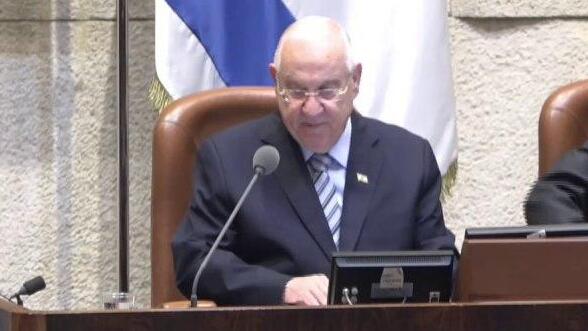

President Reuven Rivlin at the swearing-in ceremony for the Knesset
(Photo: The Knesset)
President Reuven Rivlin oversaw the unusual event after Knesset was thoroughly sprayed with disinfectant, and implored politicians to "give the people a government" after three consecutive rounds of elections.
6 View gallery
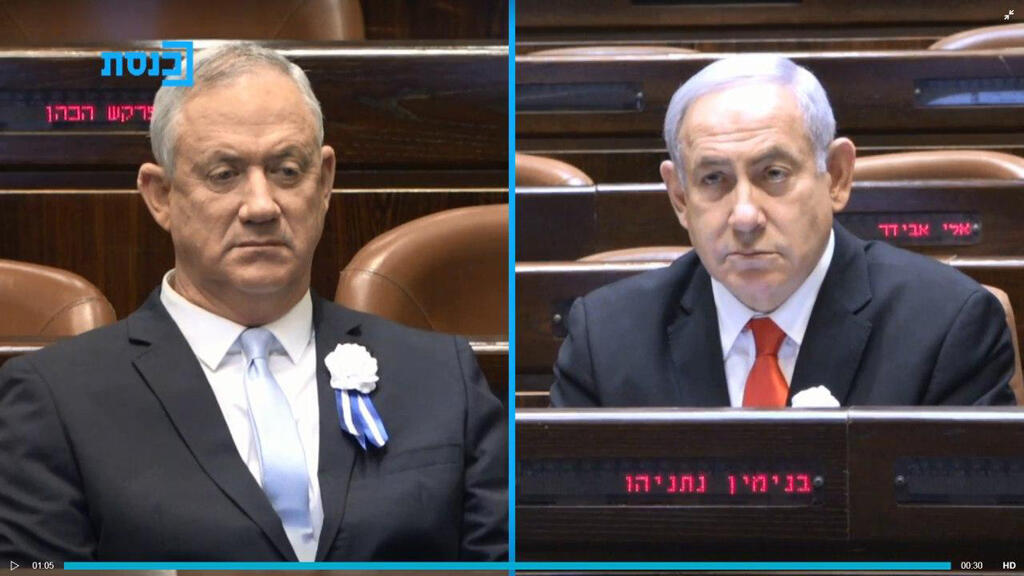

Benny Gantz and Benjamin Netanyahu at the Knesset swearing-in ceremony
(Photos: Knesset Channel)
“The requirement for compromise, to make deep and painful concessions, is the will of the people itself,' said the president. “I have just one request to make of you. Give these people a government.
"The current political crisis is very real, very deep and is breaking us in two. And we still have no other choice, because we have no other people and no other country. We were destined to live together.”
The event, coming two weeks after third national elections in less than a year, gave the country a new legislature, but Israel still seems a long way from establishing a stable government.
6 View gallery
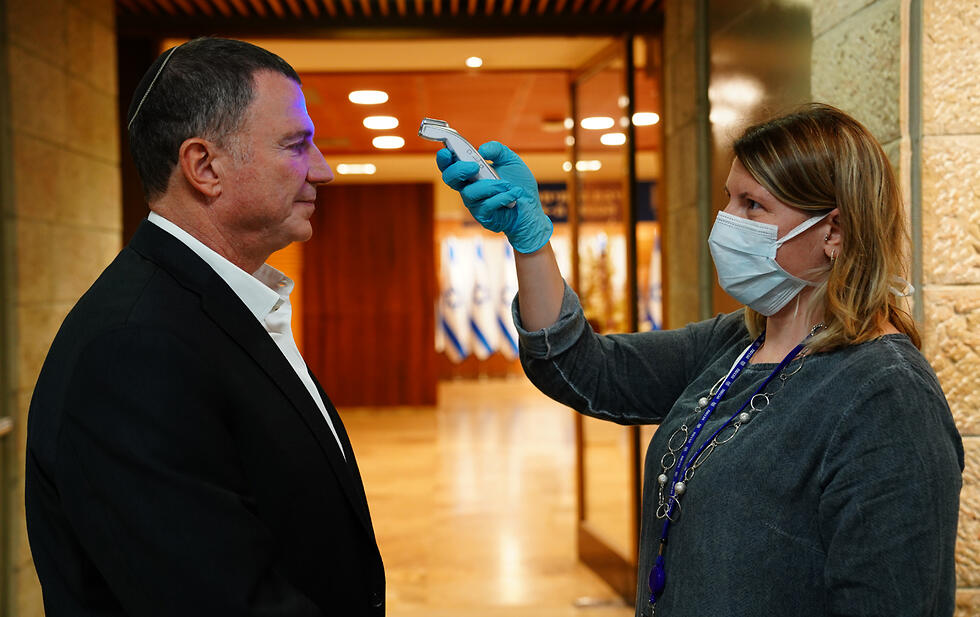

Knesset Speaker Yuli Edelstein has his temperature checked ahead of the ceremony
(Photo: Knesset)
Rivlin on Monday formally designated Blue & White leader Benny Gantz the task of forming a coalition after the retired military chief secured a slim majority of recommendations from incoming lawmakers.
Gantz promised to "do whatever it takes to form a national, patriotic and broad government within as few as possible days ."
But beyond a joint desire to oust longtime Prime Minister Benjamin Netanyahu, Gantz's bloc of supporters has very little in common.
It is deeply divided along ideological lines and appears unlikely to band together for an alternative government that could replace Netanyahu's.
Netanyahu's Likud emerged as the largest party in the March 2 election, but along with his smaller religious and nationalist allies only has the support of 58 lawmakers -- leaving his right-wing bloc three seats short of the required majority. He also faces serious legal troubles as he prepares to go on trial to face corruption charges.
Rivlin summoned both Netanyahu and Gantz late Sunday to an emergency meeting in hopes of cajoling them into a unity government.
Both men have expressed openness to the concept amid a national sense of emergency surrounding the spread of the new virus.
6 View gallery
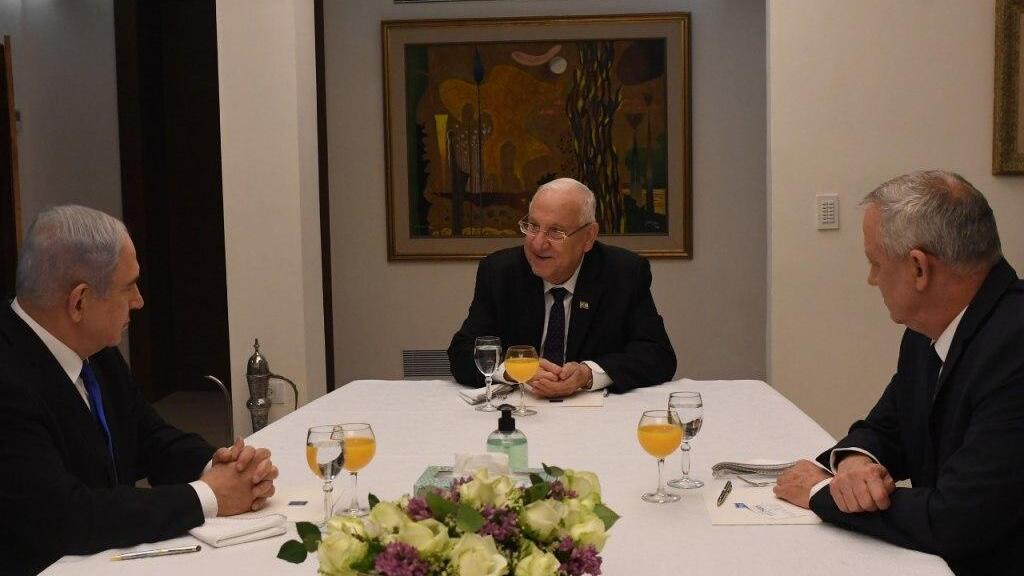

Netanyahu and Gantz meet with President Rivlin to discuss a national unity government
(Photo: GPO)
Netanyahu has been shepherding the country as it confronts a growing coronavirus threat, with some 250 people diagnosed and the number quickly rising.
The country has imposed a series of sweeping travel and quarantine measures that have thus far helped prevent any virus-related fatalities, but experts still predict many more difficult weeks ahead and the prospect of a more far-reaching clampdown on daily life.
Netanyahu's aggressive response, showcased in near-daily prime-time television addresses, seems to have boosted his standing. His criminal trial has been postponed because of the restrictions on public gatherings and the pandemic eruption has offered him an opportunity to flaunt his leadership skills and project a narrative that his legal woes pale in comparison.
A poll published Sunday night on Channel 12 news showed 62% of the public saying he was handling the crisis in a responsible manner, with 70% supporting his decision-making. The Direct Polls Ltd. survey polled 821 adult Israelis and had a margin of error of 4.1%.
Still, some of his measures have drawn stiff criticism from civil liberties groups, in particular his authorization of the Shin Bet security service to use mobile-phone tracking technology to monitor the movements of coronavirus patients.
6 View gallery
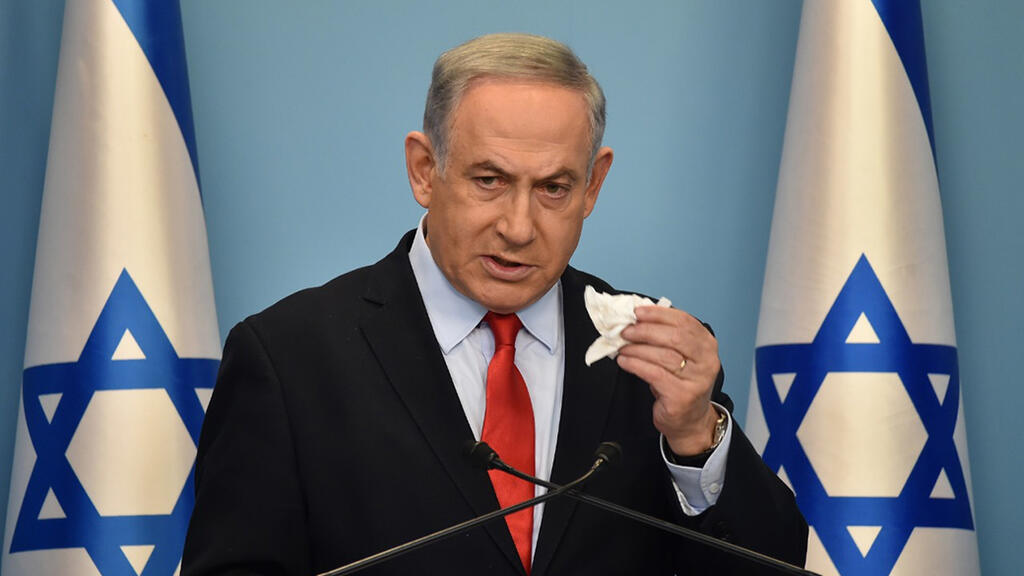

Benjamin Netanyahu talks to the Israeli public on how to prevent the spread of coronavirus
(Photo: Yoav Dudkevitch)
Opponents also bemoaned how his hand-picked interim justice minister swiftly declared a state of emergency in the court system, forcing the postponement of Netanyahu's trial for more than two months.
Netanyahu faces charges of fraud, breach of trust and accepting bribes in connection to a series of scandals. He is accused of receiving expensive gifts from wealthy friends and offering to exchange favors with powerful media moguls. The long-ruling Israeli leader denies any wrongdoing and says he is the victim of a media-orchestrated witch hunt.
Gantz ally and fellow former military chief Moshe Ya'alon has compared Netanyahu's conduct to that of Turkey's Recep Tayyip Erdogan, saying it was a "cynical exploitation of the corona crisis for the political needs of a man standing before trial."
Such protestations have swiftly drawn rebukes from Netanyahu's Likud party as petty politics at a time when the prime minister is "managing a national and global crisis in a measured and responsible fashion."
6 View gallery
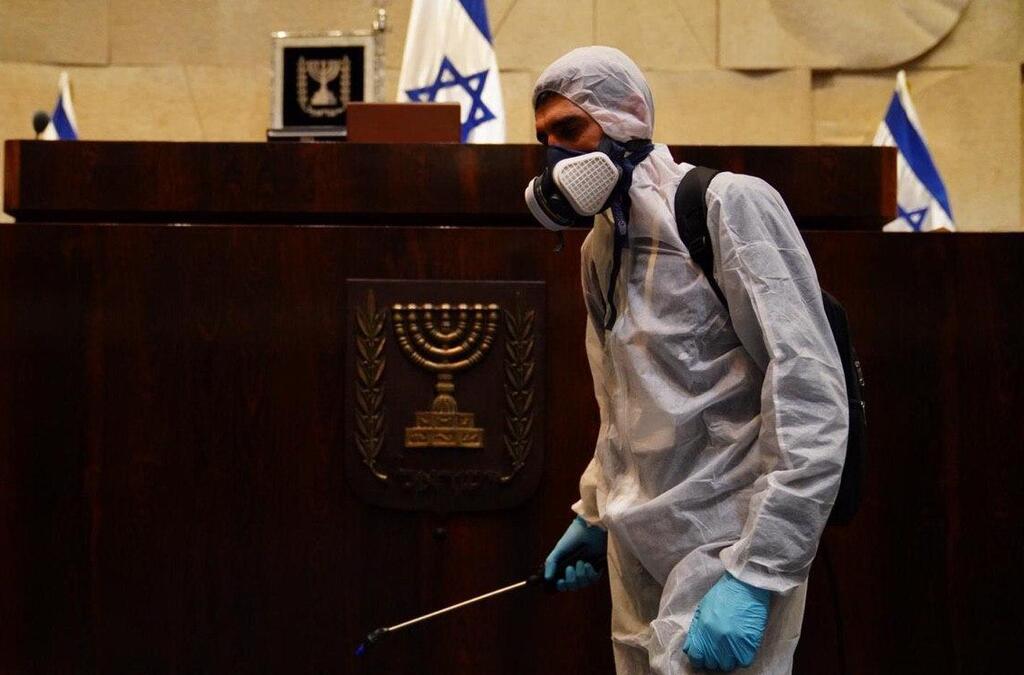

Knesset plenum was disinfected ahead of Monday's ceremony swearing in members
(Photo: Knesset Spokesperson)
Netanyahu, in his caretaker role, has invited Gantz to join him in an emergency government, suggesting they rotate as prime minister -- with Netanyahu going first. Gantz has left the door open but also dismissed Netanyahu's outreach as insincere.
Although Gantz's chances of forming a new government appear slim, receiving the "mandate" from Rivlin could strengthen his position in unity talks with Netanyahu.
During the transition period, his Blue & White party is expected to name one of its members as Knesset speaker and to pass legislation that would prevent an indicted politician from forming a new government. That legislation would impede Netanyahu's chances of victory if the country is forced into a fourth election and push him toward compromise.

